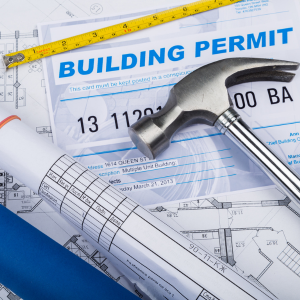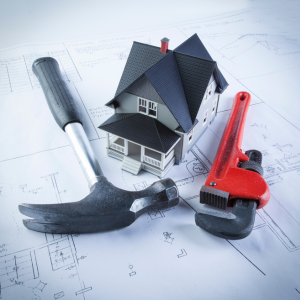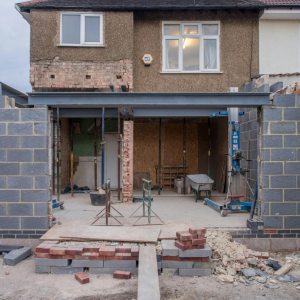
Selling a house with unpermitted work in North Carolina can be challenging. Helping Home Solutions helps homeowners navigate the rules and sell smoothly.
Understanding Unpermitted Work in North Carolina Real Estate
Understanding unpermitted work in North Carolina real estate is critical for anyone attempting to sell a home with such concerns. Unpermitted work is any building, remodeling, or modification done on a property without legal permits from local government officials.
In North Carolina, this might refer to improvements such as room extensions, plumbing and electrical upgrades, or structural changes made without following building laws and regulations. When selling a home in North Carolina with unpermitted renovations, it’s crucial to understand how these breaches can affect the deal.
Buyers may be hesitant to purchase a house if local building codes are not followed, as this can pose unforeseen dangers or liabilities. Furthermore, lenders may be hesitant to issue mortgages for properties with unpermitted work because it reduces the total value and insurability of the property.
Sellers should consider getting retroactive permissions if possible, or negotiate solutions such as price reductions or escrow accounts to cover the costs of correcting the unpermitted construction. Understanding these characteristics is crucial for successfully selling a home in North Carolina’s real estate market.
Common Types of Unpermitted Work Found in Residential Properties
In North Carolina, unpermitted construction on residential homes can hinder the selling process. Unpermitted work includes finished basements, converted garages, and enlarged living rooms built without the proper building permissions.
Homeowners often make electrical or plumbing repairs without the necessary consent from local authorities. Kitchen and bathroom remodels are also common projects where necessary permits may be missed, jeopardizing a property’s compliance with local building rules.
Other common examples of unpermitted work include the construction of decks, patios, or sheds that do not meet zoning requirements. While such upgrades may increase the practicality and appeal of a home, they can cause problems during appraisals and inspections when it comes time to sell a house in North Carolina.
Addressing these problems proactively is critical for achieving a successful sale and avoiding legal challenges.
How to Identify Unpermitted Construction in Your Home
Detecting unauthorized development within your residence is essential while preparing to sell a property in North Carolina. Commence by examining any current home improvement documentation, permits, and blueprints to verify that all modifications are documented.
Focus particularly on regions frequently modified without permissions, including finished basements, attic conversions, or supplementary bathrooms. Identify indications of recent alterations that may deviate from the original architectural style or materials, as this could suggest unauthorized modifications.
Engaging a professional home inspector can yield an expert assessment of the property and uncover any concerns associated with unpermitted activity. Inspectors are educated to identify inconsistencies in electrical systems, plumbing installations, and structural modifications that may have evaded the permitting process.
Furthermore, reaching out to local building offices for historical permission records may disclose any unauthorized modifications made to your residence. Early identification of these concerns enables you to rectify them before listing the property, facilitating compliance with North Carolina’s real estate standards and ensuring a more seamless selling process.
Legal Implications of Selling a Home with Unauthorized Modifications

When selling a house in North Carolina that has had unpermitted work done, it’s essential to understand the various legal considerations involved. It’s essential for sellers to inform potential buyers about any unauthorized modifications to prevent future legal issues.
According to state law, sellers must deliver a thorough disclosure statement that outlines the property’s condition, including any known unpermitted construction. Neglecting this can lead to significant liabilities and possible legal action from buyers who may encounter problems with insurance coverage or local zoning regulations because of these unapproved modifications.
Additionally, unauthorized work can affect the home’s appraisal value and create challenges for buyers seeking financing, as lenders frequently show reluctance to approve loans for properties with these issues. It’s advisable for sellers to seek guidance from a real estate attorney who understands North Carolina’s regulations. This can help ensure compliance and reduce risks linked to selling a home that has unauthorized work done.
Furthermore, addressing pending permits or securing retroactive approvals from local building authorities can facilitate sales and boost buyer trust.
Potential Penalties and Fines for Non-Compliant Home Improvements
If you’re looking to sell your home for cash in North Carolina, it’s essential to be aware that any work done improperly on your house could lead to fines and penalties for modifications that aren’t up to code. Making changes or additions without the proper permits can result in serious financial consequences from the local government.
In North Carolina, cities and towns can punish homes that don’t follow building requirements and rules. This can make the whole sales process more difficult. Also, these fines could include having to get permits for things that happened in the past or making expensive changes to bring the property up to code before the sale can go through.
Unresolved problems could also make it harder to negotiate with possible buyers, who might ask for lower prices or insist that sellers pay for compliance costs. If you sell a residence in this area that has work done without permission, you may face penalties. To avoid these penalties, you should talk to your local building departments and get legal counsel.
Homeowners in North Carolina who want to effectively negotiate real estate transactions, including unpermitted work, need to know what happens if they don’t follow the rules.
Impact of Unpermitted Renovations on Property Value and Marketability

A house’s marketability and property value in North Carolina can be substantially affected by unpermitted renovations. Potential buyers may perceive the property as risky or problematic when they identify that enhancements such as finished basements, decks, or additional rooms lack the necessary permits.
This belief can result in a reduction in offers or even the complete rejection of purchasers, thereby reducing the number of interested parties. Unpermitted work can complicate negotiations by raising concerns about safety standards and potential legal liabilities.
Moreover, lenders may be hesitant to authorize financing for homes that have undergone undocumented modifications, which could limit the financial options available to both buyers and sellers. It is also difficult for appraisers to determine the true value of properties that have undergone unpermitted work, as these modifications are frequently omitted from official records. This can result in a home being undervalued in comparison to similar properties that have undergone properly documented improvements.
In the North Carolina real estate market, where due diligence is essential, the sale price and the appeal of a listing can be negatively impacted by unpermitted renovations. To mitigate this, it is important to disclose them transparently and consider retroactive permit options.
Steps to Legalize Unpermitted Work Before Selling Your Home
In North Carolina, making illegal work legal before selling a house is an important step to make sure the deal goes smoothly and to avoid legal problems. To begin, you should talk to an experienced real estate lawyer or local building inspector to find out what rules and codes apply to your property.
Do a full home check to find any work that hasn’t been approved, like additions or renovations that might not meet current building codes. Once you know what the problem is, get all the necessary paperwork and plans for the job.
Send these papers to the local building department along with an application for a permit that covers the past. To make the work that wasn’t up to code, licensed contractors or architects might need to be hired. This could mean making changes or improvements that are in line with North Carolina’s residential building standards.
Before getting final approval and, if needed, certification of occupancy, make sure that all changes are checked by the local government to make sure they are up to code. Taking these steps not only helps you get permits, but they also give buyers more confidence in the house by showing that it meets all the legal requirements.
The Process of Obtaining Retroactive Permits for Past Renovations
It is frequently necessary to acquire retroactive permits for previous renovations in order to successfully sell a house in North Carolina that has been the subject of unpermitted work. This process entails the completion of specific steps to ensure that the premises comply with local building codes. In order to comprehend the prerequisites for retroactive permits and accumulate any pertinent documentation that specifies the unpermitted work, homeowners must initially reach out to the appropriate local building department.
The evidence of the completed renovations may be provided by original plans, photographs, or receipts. A licensed contractor is essential for determining whether the work complies with current safety standards and code requirements.
Before an inspector from the local authority conducts a comprehensive examination of both the new and existing structures, the contractor may need to modify the renovations or complete additional work to ensure that they are up to code. If all conditions are met, the inspector will issue a retroactive permit, which will legalize the previous renovations and simplify the process of selling a property without the legal complexities associated with unpermitted work.
Throughout this process, the successful resolution of permitting issues and the facilitation of a smooth transaction are contingent upon the careful adherence to North Carolina’s specific regulations and the clear communication with local officials.
Hiring Qualified Contractors to Remedy Code Violations Before Listing

One essential action to take when preparing to sell a house in North Carolina with unpermitted work is to engage qualified contractors to rectify any code violations prior to listing the property. Employing seasoned professionals guarantees that all renovations adhere to local building codes and regulations, thereby minimizing the likelihood of legal complications and bolstering consumer confidence.
These contractors have the requisite abilities to efficiently identify and rectify discrepancies in construction or remodeling projects, ensuring that they are brought up to code. Sellers can guarantee that the required permits are acquired and inspections are successful by collaborating with licensed contractors who are well-versed in North Carolina’s unique requirements.
In addition to facilitating compliance, this proactive strategy also improves the property’s marketability by removing potential purchasers’ concerns. By utilizing qualified contractors to address code violations, future liability is mitigated, thereby enabling a more efficient sales process and potentially achieving a higher selling price.
Case Studies: Successful Sales of Homes with Previous Permit Issues
In North Carolina, selling a property with unpermitted modifications may appear challenging; yet, various case studies demonstrate that successful transactions can be achieved with appropriate techniques. For example, a homeowner in Raleigh successfully sold their property despite an unpermitted basement remodeling by being forthright about the matter from the outset.
They collaborated closely with a real estate professional experienced in permission issues and highlighted the future worth of the additional space to potential buyers. A successful sale transpired in Charlotte, where the seller rectified unpermitted deck modifications by securing retroactive permits prior to advertising the property.
This proactive strategy instilled confidence in purchasers and enhanced trust in the transaction. A Greensboro homeowner addressed unpermitted bathroom modifications by negotiating a price reduction to account for probable future cleanup expenses, therefore alleviating buyer apprehensions.
These cases illustrate how effective communication, strategic pricing modifications, and occasionally retroactive permitting can enable seamless transactions despite existing permit complications. Each case highlights the necessity of collaborating with informed professionals who comprehend North Carolina’s real estate market and legislation pertaining to unpermitted activity.
At Helping Home Solutions, we buy houses in Winterville and nearby cities, including homes with prior permit issues. We handle all paperwork and inspections, making the selling process quick, fair, and hassle-free.
Can You Sell a Home with Unpermitted Work?
Yes, you can sell a house in North Carolina with work that wasn’t approved, but you need to be careful to make sure the sale goes well. Unpermitted work means making changes or additions to a building without getting the right permits from the local government.
When selling a house with these kinds of changes, it’s important to be honest. To foster trust and avoid legal problems later, sellers should tell potential purchasers about any work that wasn’t allowed up front.
It might also be a good idea to go to a real estate lawyer who knows North Carolina property laws to find out what selling a house with work that wasn’t allowed means. Also, hiring an expert real estate professional will help you promote the property well and show off its potential value, even though it doesn’t have any permits.
If buyers perceive potential in the improvements to the property, they could be prepared to take the chance. Offering incentives like repair credits or lower prices could help make the purchase more appealing.
In the end, the key to selling a home in North Carolina with unpermitted construction is open communication and smart negotiating.
You can sell a home with unpermitted work, which may lower the value or complicate the sale. For expert guidance, Contact Us at Helping Home Solutions.
Can You Sue a Previous Homeowner for Unpermitted Work?
People in North Carolina often wonder if they can sue a previous owner for not telling them about work that wasn’t allowed to be done on their land. The rules in North Carolina that govern real estate transactions say that sellers must tell buyers about any known flaws or work that has been done without permission that could affect the safety or value of the property.
If you buy a house and then find work that wasn’t allowed to be done, you might be able to sue the former owner if you can prove they hid this information on purpose. To learn about your choices, you need to talk to a real estate lawyer who knows North Carolina’s property laws.
They can check to see if the illegal work was hidden on purpose and suggest possible solutions, such as giving the seller money to fix the problem or making them do it themselves. To strengthen your case, you should also carefully read the buy contract and disclosure forms.
If you want to sue a past homeowner in North Carolina for doing work without permission, you need to understand these legal issues.
Are you thinking about selling? Helping Home Solutions helps you sell fast, avoid repairs, and enjoy a hassle-free sale. We make fair cash offers and take care of the details. Call (252) 541-7149 now for a no-obligation offer and start today.
| REALTOR | MORTGAGE LENDERS | CASH | JURISDICTIONS | TAXES | |
| TAX | PRIVACY | MONEY | MARKETING | LENDING | LEGAL LIABILITY |
| DISCLAIMER | DATA | PROPERTY TAXES | PROPERTY TAX | HOMEOWNERS ASSOCIATION | HOA |
| HOME RENOVATIONS | FENCE | FEE | EXPENSE | COPYRIGHT | BUDGET |
| BLOG | BEDROOM | THE COST OF | OF REAL ESTATE |
Helpful North Carolina Blog Articles
- Guide To Selling Your Home By Owner In North Carolina
- Understanding North Carolina Inheritance Laws
- Sell Your Home In Foreclosure In North Carolina
- Selling A House With Unpermitted Work In North Carolina
- Closing Costs Without A Realtor In North Carolina
- Mastering Contingencies In North Carolina Real Estate Sales
- Selling A Hoarder House In North Carolina’s Real Estate Market
- Understanding Squatters Rights In North Carolina
- How To Successfully Sell Your House With Tenants In North Carolina

